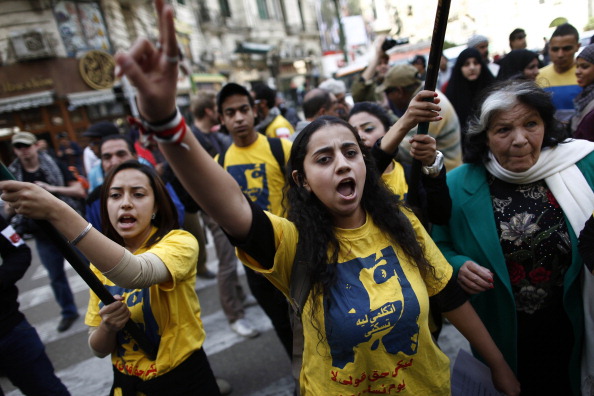
Faced with a spike in sexual violence against female protesters, Egyptian women are overcoming stigma and recounting painful testimonies to force silent authorities and a reticent society to confront “sexual terrorism” (Photo Credit: Mahmud Khaled/AFP/Getty Images).
By Tarah Demant, Amnesty International USA Co-Chair, Women’s Human Rights Coordination Group
It took Miriam Isaura López Vargas several weeks to piece together what happened to her after she was tortured and raped by Mexican soldiers. On February 2, 2011, the 30-year-old mother of four had just dropped three of her children at school in the city of Ensenada, in northern Mexico, when two men wearing balaclavas forced her into a white van and took her away.
“They tortured me. They repeatedly put wet cloth over my face and poured water over it so I couldn’t breathe. They gave me electric shocks,” she explained.
For a week, Miriam was repeatedly raped and tortured by soldiers.
Yet, despite the trauma of her ordeal and the risk of speaking up, Miriam is demanding accountability and justice. By refusing to be silent, by demanding action from the government, Miriam stands strong for her rights and the rights of all people to live lives free from violence!
We can see that same courage reflected half a world away in Egypt. Women protestors have been at the front lines of demonstrations ever since the “January 25 Revolution” (2011), but their courage has come at a heavy price. In Egypt, women protesters are doubly at risk – just like their male counterparts, they are at risk of military violence against protesters, but unlike their male counterparts, they are also being singled out for gender-specific and sexual violence – by male military personnel and non-military male protesters.
Women protestors have been at the front lines of demonstrations ever since the January 25 Revolution, but their courage has come at a heavy price.
Yet, like Miriam, Egyptian women are standing up and standing together against violence and injustice.
Both these stories from Mexico and Egypt show the effects of militarism on women’s human rights and the constant threat of violence against women, but more, both these stories show that women are more than simply victims of human rights violations; women are standing up and demanding their human rights!
These stories also both show the failure of the state to uphold the basic human rights of women. Under international human rights law, states have an obligation to respect, protect, and fulfill the rights of all people, including the rights of people to live free from violence.
Yet, as you know from reading about 16 Days of Activism Against Gender Violence, women suffer shockingly high rates of violence, both from state and private actors. A survivor of violence has the right to reparations and justice, and states have an obligation to not only prevent violence from happening, but to ensure those who commit violence are brought to justice.
You can stand with these brave women and demand justice and accountability. Join us these 16 Days of Activism Against Gender Violence to stand with Miriam, Egyptian women, and women around the globe as we join in the struggle for women’s human rights.
In the US women in the military who are sexually assaulted must bring charges to the same chain of command of those who assaulted them.